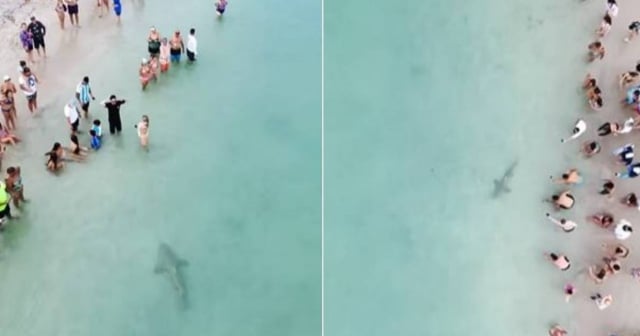Images from the body camera of one of the rescuers who intervened in the first moments after the Cuban José Ángel Abreu was bitten by a shark on Monday afternoon, reveal the professionalism of the emergency service and the fisherman's tough ordeal.
In the video -released by local media outlets- it is evident that Abreu did not lose consciousness and a key part of the first aid was to apply pressure to his thigh to control the bleeding and prevent a potentially lethal hemorrhage.
The images also show the concern of their children, who witnessed the tough moment.
The Cuban man was spearfishing on a reef off the coast of Key West when he was attacked. He was brought to shore on Stock Island shortly after and airlifted to the hospital.
“I would have died and my children would have seen everything there, as they were right there in front,” said Abreu in a statement to a journalist from Noticias Telemundo.
The Cuban, 37 years old and resident in the city of Opa-locka, in Miami-Dade County, was helping a friend spearfishing and had a fish by his side when a bull shark approached him.
"That was like lightning, seeing the shark approaching you with its mouth open, all you can think is that it's going to eat you," described the man, who struggled and managed to free himself.
However, the shark left and then returned to bite his left leg, and there he could not avoid it anymore, despite the victim of the attack explaining that when it clung to his lower limbs, he tried to hit it.
The Cuban also suffered injuries to the right side of the chest and the left arm.
It was thanks to his friend, David Cruz, that he managed to scare off the shark, which, wounded, José Ángel Abreu was able to reach the boat where his 10 and 12-year-old sons were waiting for him.
He never lost consciousness, not while the boat was returning to the marina, nor when he was taken away in a medical helicopter.
In another of the interviews he has given in recent days from Jackson Memorial South Hospital, where he is admitted, he emphasized that he thought he was going to die and that his children begged him not to die.
"I feel happy to have a second chance and at least to be whole and not lack any part of my body," concludes with humility and visibly moved, José Ángel Abreu, who is aware that he has been given a second chance at life."
"It is unlikely that a shark will attack, and even less likely that it will turn around and keep trying," said the biologist Camila Cáceres in statements to the aforementioned media outlet.
However, in recent months, reports are growing on different coasts of the United States confirming several attacks, some of them resulting in serious injuries.
Last year there were 36 unprovoked shark attacks on humans in the United States, and two of those people died, according to data from the International Shark Attack File at the Florida Museum of Natural History in its most recent annual report.
The project, which documents shark attacks worldwide, says that the risk of being attacked by a shark is relatively small, but warns that swimmers can minimize their risk even further by staying in groups and closer to the shore.
What do you think?
COMMENTFiled under:
